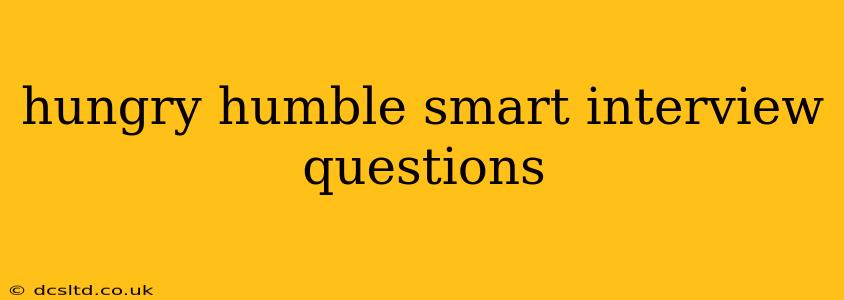The "hungry, humble, and smart" interview question isn't a straightforward query about your appetite or demeanor. It's a subtle probe into your character, work ethic, and self-awareness—three crucial attributes employers seek in high-performing candidates. This seemingly simple question delves deep into your potential contributions to their team and company culture. Let's unpack each element and explore how to answer effectively.
What Does "Hungry" Mean in an Interview Context?
"Hungry" in this context doesn't refer to your lunchtime preferences. It signifies a strong desire to learn, grow, and achieve. Employers want to see evidence of ambition and a proactive approach to your career. They're looking for candidates who are:
- Driven by Results: Do you set ambitious goals and actively pursue them? Can you provide examples of exceeding expectations or pushing beyond your comfort zone?
- Passionate About Learning: Are you constantly seeking new knowledge and skills? Do you proactively seek out challenging assignments or opportunities for professional development?
- Self-Motivated: Can you work independently and maintain momentum even without constant supervision? Do you possess an intrinsic drive to succeed?
Example Answer: "Hungry for me means a relentless pursuit of excellence and a genuine passion for continuous learning. I'm not content with simply meeting expectations; I'm driven to exceed them. For example, in my previous role at [Company Name], I identified an area for improvement in [Specific Area] and proactively developed a solution that resulted in a [Quantifiable Result]. This wasn't assigned to me; it was something I saw as an opportunity to make a significant contribution."
What Does "Humble" Mean in an Interview Context?
Humility in the workplace translates to a collaborative spirit, a willingness to learn from others, and an understanding of your own limitations. Employers value humility because it fosters teamwork, reduces conflict, and promotes a positive work environment. They're looking for individuals who:
- Are Open to Feedback: Do you actively seek constructive criticism and use it to improve your performance? Are you receptive to different perspectives?
- Are Team Players: Do you prioritize collaboration over individual glory? Can you work effectively with others to achieve common goals?
- Are Self-Aware: Do you recognize your strengths and weaknesses? Do you acknowledge your mistakes and learn from them?
Example Answer: "For me, humility means being open to feedback, acknowledging my limitations, and valuing the contributions of my colleagues. I believe that collaboration is key to success, and I’m always willing to learn from others, regardless of their position or experience. In a recent project, I initially struggled with [Specific Challenge], but by actively seeking feedback from my team, I was able to overcome this obstacle and deliver a successful outcome."
What Does "Smart" Mean in an Interview Context?
"Smart" encompasses more than just academic intelligence. It refers to your problem-solving abilities, critical thinking skills, and overall aptitude for the job. Employers want candidates who:
- Are Analytical: Can you identify problems, analyze situations, and develop effective solutions? Do you approach challenges with a logical and systematic approach?
- Are Creative: Can you think outside the box and generate innovative ideas? Do you possess the ability to adapt to changing circumstances?
- Are Adaptable: Can you quickly learn new skills and technologies? Are you comfortable with ambiguity and uncertainty?
Example Answer: "To me, smart means possessing a combination of analytical and creative problem-solving skills. I enjoy tackling complex challenges and finding efficient, innovative solutions. For instance, when faced with [Specific Problem], I utilized my [Specific Skill] to develop a strategy that not only solved the immediate issue but also prevented similar problems in the future."
How to Prepare for the "Hungry, Humble, and Smart" Interview Question
The best way to prepare for this question is to reflect on your past experiences and identify specific examples that demonstrate these three qualities. Prepare concrete examples showcasing your:
- Achievements: Highlight instances where you went above and beyond expectations.
- Learning Experiences: Describe situations where you learned from mistakes or acquired new skills.
- Teamwork: Illustrate how you collaborated effectively with others to achieve shared goals.
By preparing compelling examples, you'll be able to articulate your "hungry, humble, and smart" qualities convincingly and leave a lasting positive impression on the interviewer. Remember to be authentic and let your personality shine through.
People Also Ask: Addressing Common Questions
This section addresses frequently asked questions related to the "hungry, humble, and smart" interview query, providing a more comprehensive understanding of the employer's expectations.
What are some examples of being hungry in the workplace?
Examples of being "hungry" include consistently exceeding expectations, volunteering for challenging projects, actively seeking feedback for improvement, and pursuing continuous professional development. Quantifiable results are always powerful in demonstrating this trait.
How can I show humility in a job interview?
Demonstrate humility by acknowledging your weaknesses, actively listening to others, and giving credit where credit is due. Share instances where you learned from a mistake or sought guidance from colleagues.
How can I demonstrate intelligence in a job interview?
Showcase your intelligence by clearly articulating your thought process, presenting well-structured answers, and providing insightful solutions to hypothetical problems. Referencing your past achievements and the skills you've acquired is also helpful.
Is it important to be humble in the workplace?
Yes, humility is crucial for teamwork, collaboration, and creating a positive work environment. It fosters open communication and allows for constructive feedback, ultimately contributing to greater success.
How can I prove I'm a team player in an interview?
Describe specific situations where you collaborated effectively within a team. Highlight your communication skills, your ability to compromise, and your contribution to the team's success. Use the STAR method (Situation, Task, Action, Result) to structure your answers.
By thoughtfully addressing each component of the "hungry, humble, and smart" question and preparing relevant examples, you can demonstrate your suitability for the role and create a strong impression on the interviewer. Remember to be genuine, authentic, and focus on providing specific, impactful examples to showcase your capabilities.
